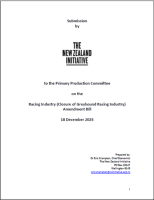
Submission: Racing Industry (Closure of Greyhound Racing Industry) Amendment Bill
INTRODUCTION AND SUMMARY 1.1 This submission on the Racing Industry (Closure of Greyhound Racing Industry) Amendment Bill is made by The New Zealand Initiative (the Initiative), a Wellington-based think tank supported primarily by major New Zealand businesses. In combination, our members employ more than 150,000 people. Read more









